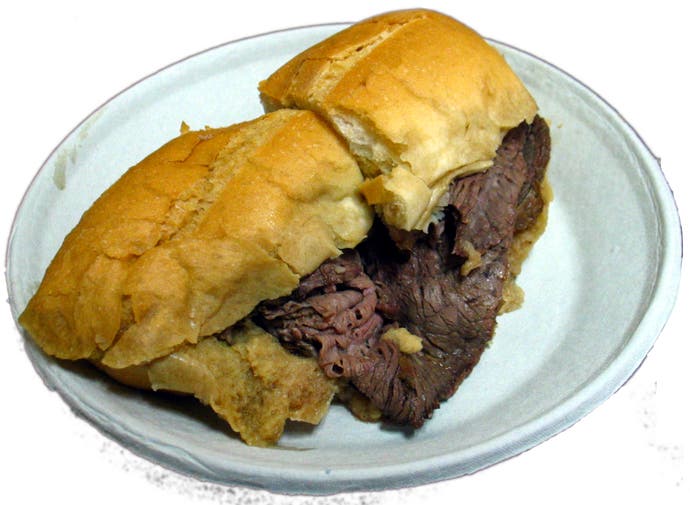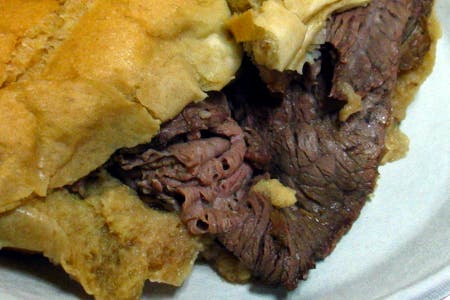How are video games like a French Dip sandwich?
They're both too good to be lost to history.
Phillipe's is a small fast food restaurant located in Los Angeles' Chinatown - although I think it predates most of the neighbourhood surrounding it. Phillipe's has been there since 1908, in fact, which makes it fairly venerable in local terms. It's an LA landmark, and it feels like it, too. You walk in, and it's dark and pleasantly grimy: you instantly feel like you're in on something good. It looks like a cop hangout or a favourite lunch spot for private eyes. I once asked my Dad whether his dad - who actually was with the LAPD between the 1930s and the 1950s - ever went there, but, being a richly and instinctively prejudiced man, Sergeant Donlan tended to avoid the place. You know, because of the French name.
He was missing out. The other day, I went to Phillipe's with my aunt and uncle. I've wanted to go for ages. It's one of a couple of different places in the States that claims to have invented the French Dip sandwich, see, where the bun is soaked in gravy before serving. "Soaked in gravy" is one of those phrases you learn to listen out for in life. Long story short, I can confirm that the turkey French Dip, at the very least, is totally amazing, and the potato salad is even better. But there's something more to my visit than that, though. There's something about Phillipe's that got me thinking about video games.
That's because, while the food is great, what's really special about Phillipe's is the way that it's kept old LA - and, to a certain extent, old America - alive. There's sawdust on the floor here, there are old pressed-tin advertisements for the railways on the walls, and there's a rack of wooden telephone booths in a corner, waiting, presumably, for Jimmy Stewart to pad over and drop a dime. The cashiers don't take plastic at Phillipe's; it's like they aren't yet comfortable that the whole idea of credit is going to stick. Instead, there's this complex ritual where you have to put your money in a marbled tray on the counter and then they take your tray away and quickly bring back your change. The plates aren't made of normal plate stuff, but of roughly pulped cardboard. The ladies behind the counter look like ladies out of a Gary Larson cartoon: weighty, bespectacled, crimp-lipped, full of knowledgeable disdain for their clientele. There are rituals, here. There is private terminology.

It made me think about preservation. Phillipe's has preserved the French Dip, of course, but that wouldn't actually be too much of an achievement by itself: take a couple of pictures, write down the recipe, and you can preserve the French Dip too. Phillipe's, though, has actually done so much more than that. It's preserved all the stuff that makes the French Dip special, trading you 10 dollars or so for a few minutes' precious access to the era in which a sandwich dipped in gravy seemed like kind of a ritzy idea. The sandwich is always going to taste good, in other words, but when I go back to Phillipe's, it's probably not going to be the food leading me there: it'll be a better insight into the city where so many of my family grew up.
I'm thinking more about stuff like this because games are growing up, too, and they're changing so rapidly that I'm starting to realise that the ways my children will one day play them will be very different from the ways I played them when I was a kid. I want to preserve those games I grew up loving - I want us to be able to explain to the next generation what games were like for us and why they have always been so exciting. But cripes: how do you go about doing that?
Focusing on the hardware and the software is not all that's needed, I suspect. Putting a Megadrive in a locked safe so that some non-linear robot genius from the year 4500 can poke around on Quackshot isn't really the complete solution, is it? It's like the photo and recipe approach to the French Dip: you get the basic material, but you lose the vital context that brings the whole thing to life. For Phillipe's you lose the sawdust, the fearsome old ladies, the pulped paper plates. For Quackshot, you lose the whole business of expectation as you stare at the screenshots in some magazine or other and wonder how well it's going to animate. You lose the rumours at school about the one kid who had the game early, and the flurry of negotiations as that single copy got loaned around, and then everyone compared notes.
None of that sounds particularly exciting, perhaps, but it was a crucial part of my enjoyment of games as a kid: the longing, the endless granular discussions of parallax scrolling and secret areas, the trading and the bargaining. Having spoken to a few people associated with things like the National Videogames Archive, capturing exactly this kind of thing seems to be a problem they're all too aware of. The code - and the stuff that runs the code - is a good place to begin, but where do you go next? How do you get to the interaction that makes games special? How do you get the forensic examination of the pages of Mean Machines, the arguments about Mario and Sonic having a fight? How do you get all the other rituals, private and public, that got us hooked, and perhaps have helped keep some of us hooked, too?
When Simon Parkin went to meet Nolan Bushnell recently, he spent some of his time at Barcade in Brooklyn, in which old arcade machines are placed, hopefully non-ironically, in a setting very similar to the one they were originally built for: smoky, slightly seedy gloom where drinks are spilled and loose change jingles in pockets. Hey, we're back in Phillipe's! Barcade and places like it are a great step forward: you get the original hardware, and you get a hint at the original context. Good stuff, but arcades had it relatively easy, remember: like fancy deli sandwiches, you went to a specific place to enjoy this sort of game, and these specific places were often relatively similar across large chunks of the planet. Home consoles and personal computers and mobile platforms and everything since makes preserving the important contextual elements much harder: the world of games has become more personal, and more varied.
Example: when I think of Monkey Island, the fact that it was the first really funny game I played is only part of what I actually love about it. What I really love, if I'm being honest, is memories of staying up late during sleepovers to play it on my friend Gareth's family Viglen, while his moderately terrifying parents snored upstairs, and the streetlights outside cast the hallway where his PC was kept in a sickly sodium orange. I think about those evenings quite a lot, even now: they've stayed sharp in my mind while so much else has faded. I want my kids to have their equivalent of memories like that - although possibly without the Monkey Island code wheel, which Gareth kept losing - and it would be cool if they knew that those evenings were part of an informal tradition.
I don't know how to go about saving what's great about old games, of course, but a few years back, I visited the Game On exhibition in London, and one interesting thing struck me. The wonderful old hardware and the wonderful old software was there, and you could play on most of it if you could stomach the odd queue; as archives go, it was a decent jumping off point. What was really effective, though, was seeing the games and consoles juxtaposed with pieces of player testimony: a twenty-something guy listing his various retro purchases in minute, granular detail, and a kid - apologies, I've shamelessly used this before in a Zelda preview that simply wouldn't bring itself to a neat conclusion - talking about the manner on which his lavish adventures in Hyrule had informed his own make-believe world in the back garden.
We need to preserve the players as well as the games in some way, and perhaps the anecdotes we pass down could be an important part of that. You know, anecdotes about classic WOW sessions, all day Worms 2 binges, that week you took off from uni to work through Metal Gear Solid 2, that period where you played Gears of War every Thursday with people from the office, and watched as they slowly became your friends. Is that as good as a trip to Phillipe's? No, and it's not as tasty, either - trust me. It's a start, though, and there might be an additional benefit, too. Whenever I think of the Monkey Island evenings over at Gareth's, one thought connects to another, and pretty soon so many little things I'd otherwise have forgotten are spilling back into my head in a reverie that I'd describe as Proustian, if only Proust had ever dropped 30 notes on - ugh - Galaxy Force, and if only his madeleine was a box of blue plastic diskettes.
If our memories are one of the keys to preserving games, then, maybe games can help preserve our memories at the same time. By saving games, we'll be saving some crucial part of ourselves.

